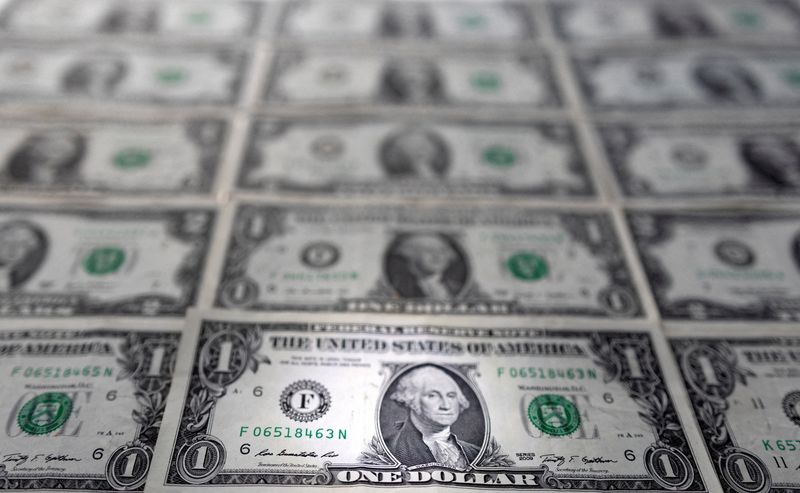By Jamie McGeever
ORLANDO, Fla. (Reuters) -The highest inflation in decades is unraveling whatever policy consensus there was between the world's major central banks since the Great Financial Crisis and global markets could buckle under resulting waves of stress and volatility.
A turbo-charged dollar, which often both reflects and fuels financial market stress, risks a vicious cycle as a scramble for dollars intensifies, tightens global financial conditions and increases volatility.
The dollar's surge to its strongest level in 20 years not only reflects how aggressive investors expect the Federal Reserve to be in raising interest rates, but also how fragmented the global central bank landscape is.
While the U.S. monetary authority appears strapped in for the most aggressive tightening cycle since 1994 both in scale and speed, others are at various stages of the battle against inflation, and with varying degrees of appetite for the fight.
The Fed's expected path stands in stark contrast to its three biggest peers. Central banks in Japan and China are still easing policy and the European Central Bank will struggle with its plans to tighten amid recession fears from a Ukraine-related energy shock.
Whatever path major central banks follow, the burst of global inflation and fragmented policy response has put a fire under global market volatility - U.S. Treasuries implied volatility is the highest since 2009 and global financial conditions are also the tightest in 13 years.
As analysts at Bank of America (NYSE:BAC) put it, two years of pandemic-fueled quantitative easing worth around $11 trillion globally is ending and markets' 'volatility anchor' has been removed, threatening the disorderly moves in rates and currency markets that policymakers are desperate to avoid.
"Market panics (are) often associated with divergent central bank policy objectives," BofA wrote on Friday.
$1 TRILLION DEBT
The dollar index, a measure of the greenback's value against six major currencies, is the highest since 2002. Although it has risen rapidly this year and may be due a profit-taking pause, many analysts reckon it still has room to appreciate further.
A stronger dollar makes it more expensive to service dollar-denominated debt for overseas borrowers. According to Institute of International Finance estimates, well over $1 trillion of dollar debt held in emerging economies will mature by the end of next year.
A rising dollar and U.S. borrowing costs have slammed global financial markets - the S&P 500 just had its worst January-April performance since the 1930s, while U.S. bond market volatility and Goldman Sachs (NYSE:GS)'s global financial conditions index are the highest since 2009.
The additional problem policymakers face is essentially the irrationality and herd-like behavior of financial markets. Once currency traders sense weakness or fracture, they go for the jugular, and market overshoots can exacerbate underlying economic problems.
ECB Executive Board member Isabel Schnabel in a March 17 speech nodded to the danger of allowing policy divergence to widen too much.
"A reaction function that differs materially from that of other central banks facing a protracted period of above-target inflation risks amplifying the energy price shock by weighing on the exchange rate, thereby adding to the burden on real household income," she warned.
Chris Marsh, senior advisor to Exante Data and a former economist at the International Monetary Fund, says the wide divergence can only continue for so long before other central banks have to follow the Fed.
"If the ECB and others don't keep up, they end up importing inflation. And inflation is already very high. So to not keep up with the Fed will be very difficult for them," Marsh said.
Related columns:
Given what followed, emerging markets fear 1994 Fed redux (Reuters, April 25)
Pumped-up dollar compounding global liquidity squeeze (Reuters, April 22)
Hedge funds' bullish dollar view distorted by yen outlier (Reuters, April 18)
Euro FX reserve demand returns after years of neglect (Reuters, April 13)
(The opinions expressed here are those of the author, a columnist for Reuters)
(By Jamie McGeever; Editing by Andrea Ricci)
